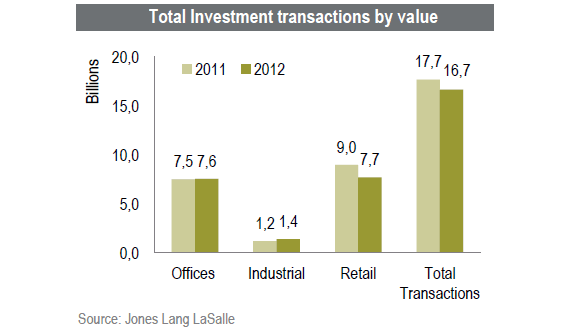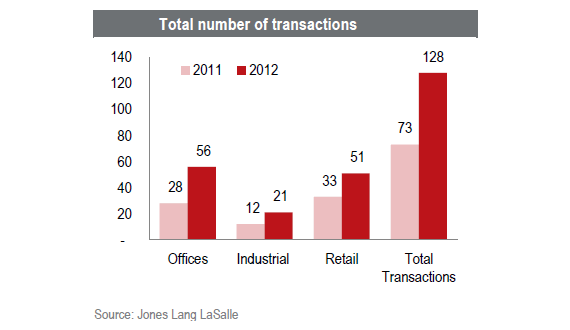SA Commercial Property Market has Shortage of Quality Property Assets
 Commenting on the report, Head of Research at Jones Lang LaSalle South Africa, Ndibu Motaung said there is a shortage of quality assets for sale in the investment market “as matured funds are holding on to prime assets”.
Commenting on the report, Head of Research at Jones Lang LaSalle South Africa, Ndibu Motaung said there is a shortage of quality assets for sale in the investment market “as matured funds are holding on to prime assets”.
South Africa has shortage of quality assets for sale in the investment market as matured funds are holding on to prime assets, according to Jones Lang LaSalle’s latest Commercial Real Estate Transaction Review report for April 2013.
Investors who are holders of prime properties are finding little incentive for disposal as replacement stock is very thin. The demand for commercial property may eventually trigger new builds.
According to Jones Lang LaSalle, the year 2012 recorded 5% reduction in total value of commercial property transactions, down to R16.7 billion from R17.7 billion in 2011, although the number of recorded transactions increased by 75%.
The number of commercial property transactions increased sharply last year, while the average size of transactions declined, reflecting more frequent small property deals and a shortage of large assets on the market.

Had Redefine Properties or Growthpoint Properties acquired Fountainhead Property Trust’s R10.3 billion portfolio during the year, this picture would no doubt have looked different.
The gap between prime and secondary market is likely to widen further as prime stock continues to be highly sought after but limited options are available. This will result in prime properties becoming more expensive, thus compressing yields further.
Despite the comparative reduction in total transactional value, the number of recorded transactions increased in all three sectors — office, retail and industrial. A total of 128 transactions were recorded last year, up from 73 in 2011, with the volume of office transactions increasing by 100% year on year.

The total of transferred GLA increased by 23% in 2012 to reach 1,7 million m², this despite the V & A Waterfront transaction which took place in 2011.

South Africa’s cross border transaction volumes is almost non-existent particularly within the African continent. However, there is increasing interest from South African companies to focus more on the African continent, despite limited capital commitment in Africa.
The only notable realised cross border transaction was the acquisition of 85% shareholding of Accra Mall in Ghana by Sanlam and Atterbury Fund from Actis Despite this limited activity within the African continent; there are inroads into investing in African real estate by local companies, with a number of announcements skewed to development projects rather than acquiring existing assets.
The most significant transactions were between listed funds, with smaller funds picking up secondary grade stock. Stanlib investment analyst Ndabe Mkhize said within the listed property sector, “the transactions that we’ve seen have been bigger companies selling smaller assets because those properties are either noncore or the companies are attempting to get a high ‘return on effort’ by focusing on a few but individually large properties”.
The higher number of deals and corresponding lower total value of transactions was not likely to be due to a rise in capitalisation rates or a decrease in the value of properties on a like-for-like basis. “In our view, it’s a question of big property companies selling a large number of smaller properties,” Mr Mkhize said.
An example was Capital Property Fund, which had recently announced the sale of some of its assets to newly listed black economic empowerment funds. There was also more activity among the newly listed groups who generally had smaller assets and acquired assets from private individuals or other small groups. He said that the bidding war for Fountainhead Property Trust’s R10.3bn portfolio by SA’s two largest listed property groups could be attributed to the shortage of large and quality assets in the market.
Fountainhead had assets, including Centurion Mall and the newly redeveloped Blue Route Mall, which was “why it was contested so much”. “It was probably the last retail portfolio with good assets that was available — both players were keen on it.”
One of the recent large transactions, Hyprop Investment’s acquisition of the Somerset Mall from Sycom Property Fund for R2.3bn, was a way for Sycom “to end the stalemate” with Hyprop rather than Sycom identifying an opportunity to cash in. Hyprop’s acquisition is being settled by the transfer of 81.5-million Sycom units held by Hyprop to Sycom.
Investment in commercial real estate is viewed as risky without consumer demand, but in this situation there is a ready market for new commercial buildings. If developers can get projects off the ground, filling the buildings should not be an issue.












